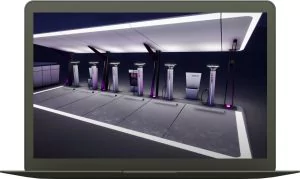With electric vehicles (EVs) like Tesla, the car of the main character from the Taxi movie doesn’t look so futuristic anymore. Electric vehicles themselves aren’t something impressive today as they became an ordinary thing for many people. Deloitte’s outlook report estimates worldwide EVs sales equal to 21 million units by 2030, so EV revolution seems to remove gasoline cars from the spotlight of global use.
The future predicted long ago has come, and EVs are just another type of transport that is cheap and eco-friendly. However, this prediction isn’t that plain. Actually, the prime time of electric vehicles lies ahead as numerous Internet-of-Things (IoT) solutions are coming into play.
A global rise of environmental awareness and affordable car’s battery charging are conventionally the main reasons for growth of the electric vehicles market. But integration of IoT devices with electric vehicles offers benefits and thus business opportunities that are going to multiply within the years to come. In this article, the JatApp team will provide you with a full overview of the market opportunities for IoT in electric vehicles management, so keep reading to learn more.
Connectivity owns the future
Since electric vehicles are becoming an essential part of our lives, it’s fair to say that this type of transportation needs its own infrastructure. And that’s the point where the problems begin. Electric vehicles need to recharge from time to time, which is why more charging stations should appear.
According to 91% of EV stations providers, establishment of a global network of connected charging points is the top priority for EV industry today. While the electricity consumption isn’t that serious, an equal distribution and availability of charging stations is a direction where businesses need to look at.
Nevertheless, covering the whole planet with EV stations is actually a piece of cake, but ensuring that all of them are working properly is the core of the problem. That is why connectivity of charging stations and other IoT devices used with electric vehicles is the backbone of the possible solutions and therefore business opportunities.
Without sufficient connectivity, EV stations face multiple hiccups that significantly damage performance and profitability of EV infrastructure. When a charging point has poor or no connectivity, it’s almost impossible to determine whether the station works well.
In case a station falters and there’s no Internet connection, the station provider can’t know about the failure and takes no action. As a result, EV owners are unable to charge their cars at this station and have to drive to another one (if they have enough battery power at the moment).
Additionally, loss of connectivity can lead to improper or no billing of EVs owners. Such roadblocks can cause significant financial damage to businesses that try to expand EV infrastructure. IoT News estimates that an accumulated year of poor charging station connectivity and downtime can result in more than $10 million of loss.
Still, when a charging station gives you lemons, make a lemonade. JatApp’s client from Switzerland recognized an opportunity to keep track of stations’ connectivity and performance status. The client already had an electric vehicle charging solution, but they wanted to develop software that can monitor and manage charging stations with greater efficiency.
Our company developed a web application that serves three types of users: the client’s support teams, businesses that rent or have purchased charging stations, and EV owners. Even though the functionality for each user group evidently differs, the solution’s main task is to report about location of charging stations, their connectivity, and performance status.
When any charging station loses connectivity or sends a notification about its inactive status, it’s possible to fix the problem in no time. In addition, many problems can be solved remotely, as the electric vehicle monitor system can remotely reboot each station.
However, the above mentioned approach is just one way how digital solutions can advance EV’s charging stations. As soon as you ensure that your charging stations’ network is connected 24/7, you can take different directions towards scaling your business. Amongst many opportunities, we can single out the following:
- Charging station access by a subscription. If you want to be 100% sure that you get money for the service, offering access to your EV charging management platform by subscription is the best way. Needless to say, there are tons of ideas on how you can scale up your solution further. Actually, you can combine it with any other options we describe in this list.
- Power management system. Aside from just offering charging stations access, you can create additional value to EV owners by offering them to return the battery power back to the station network. In case an EV owner doesn’t plan to drive a lot in the next couple of days, they can connect their EV to a nearest charging station and give some of the car’s battery power back and get paid. In such a way, you generate extra electric power at a lower price. Likewise, notifying customers about the hours when electricity and charging are at the lowest price can be another feature to expand the functionality of EV charging stations.
- Battery and EV diagnostics. Even though EVs are commonly approached as gadgets on four wheels, they’re still cars in the first place. It means that technical service and diagnostics are paramount, and that’s another way to create an extra value for EV drivers. Providing information about battery and charging process status, as well as analytics of a car’s performance can be a useful addition to charging stations as battery capacity state means the longevity of EV in general.
- Integration with a smart home. Since the popularity of EVs grows, many people install charging stations at their houses to charge their cars without looking for the closest charging point available. You can take this kind of business to the next level by offering charging stations that are connected to a customer’s home electric circuit and serve as a barrier to voltage swings. As humanity heads towards making their homes more connected, a need for stable power grids grows accordingly. In case a customer leaves their EV charging and suddenly turns on their connected devices or home appliances, the power grid needs to handle this. You can be sure that there’s a demand for such sort of IoT platforms as Span Drive already offers relatable solutions.
- Recreation and entertainment. By taking this direction for your business growth you literally intend to steal the march from roadside rest stops and motels. Historically, a rare gas station is just a place where you fuel your car and drive away. The same concept applies to EV charging stations as well. For instance, the startup Ionity is going to create such kind of rest stops where both EVs and their owners can recharge. Adding a shop, cafeteria, service station, or even motel to your charging station is already a good business idea as more and more electric cars will appear in the near future.
Ionity charging station design concept
Beyond a doubt, the list of opportunities related to EV charging stations grows every second, but we would like to highlight that you have to make sure that connectivity of your stations is good and stable. Otherwise, all your business plans are no more than a pipe dream.
When every car is a highway star
The IoT technology opportunities for EVs don’t end with charging stations, as there are many other ways connected devices can advance EV driving experiences. IoT devices can improve any element of an electric car: smart climate control, route planning, Spotify playlist search, or ordering a cheeseburger from a diner you’ll drive by. It will take ages to mention all specific opportunities here, which is why we just leave you with some food for thought: with IoT, a car can become something like a home that you can move.
At the same time, TechCrunch talks about two submarkets that are going to grow within the next five years: vehicle-to-vehicle (V2V) connectivity and vehicle-to-infrastructure (V2I) solutions.
Speaking about V2V, it is a technology based on IoT platform that enables cars to actually “communicate” with each other by sharing speed, direction, braking, lane changes and other on-the-go data that can be useful while driving on a highway. For example, when one car unexpectedly starts braking, it sends the relatable data to the cars behind it, and they also brake automatically to avoid bumping into each other.
As for V2I, things are no less exciting. Apart from EVs communicating with each other, they can also “talk” to various connected objects on the road: traffic lights, toll booths, freeway ramp signals, and so on.
V2I solutions can inform about changing weather conditions on the road, nearest emergency vehicles, jammed traffic on some part of the road (and propose an alternative route), and road work zones. To this end, exchange of large amounts of data in real time will benefit EV owners, significantly offload traffic, and help to avoid many accidents.
On top of that, V2I implies that the whole ecosystem of connected devices and cars, also called “Internet-of-Cars” should be created. As we’ve mentioned earlier, it means that your business will have more EV users attracted and you’ll have extra reasons to keep your business scaling.
Pave the road to innovation today
Even though the people’s love affair with electric vehicles is getting stronger each day, you’ll need to spice things up with relatable infrastructure and solutions like we’ve discussed in the article. That’s why you need to start working on your solution now to create a timely and valuable proposition to the EV market that is bursting with one more explosion.
JatApp team can provide you with a skilled tech team who has seven year experience in developing IoT solutions. You will get not only the quality IoT product for electric vehicles, but also a professional business analysis that will help to align the solution with your business goals.
To cooperate with us, just leave your contact details. We’ll get back to you as soon as possible.











